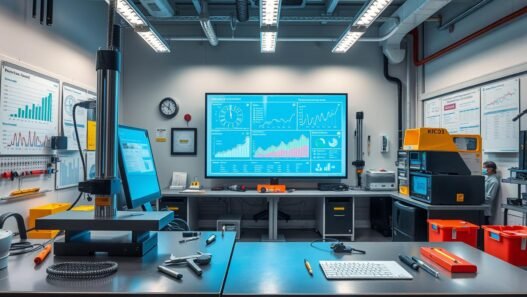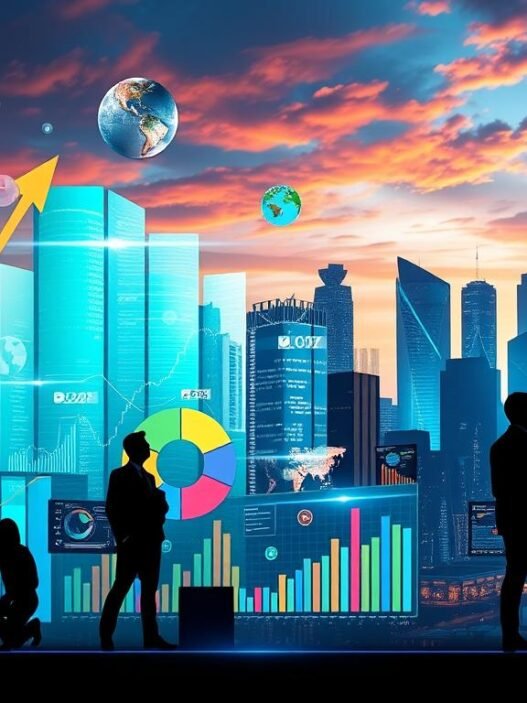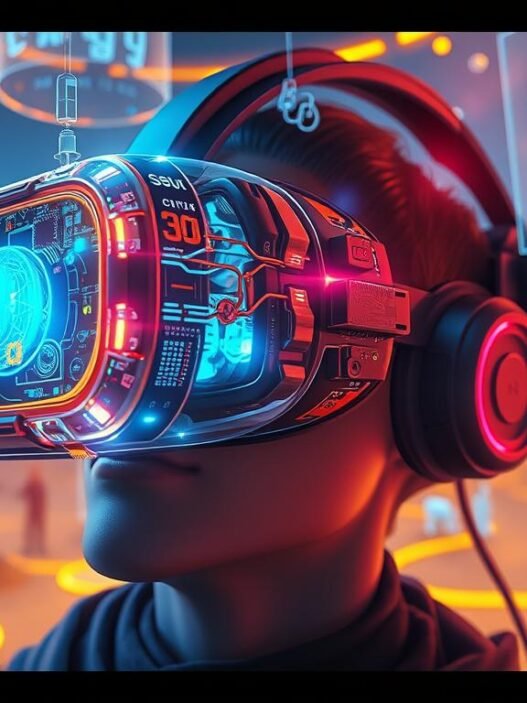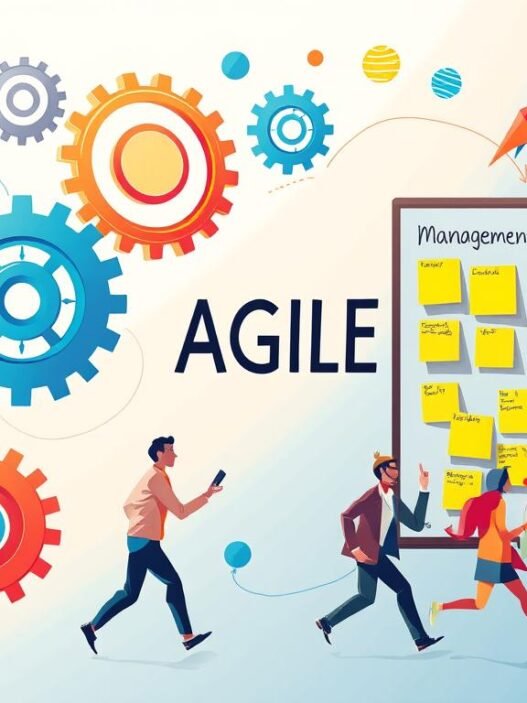In 2017, only 17% of top business leaders in the U.S. knew about artificial intelligence (AI)1. This shows how fast AI has grown and how important it is today. Now, AI is key in many areas, changing how we live and work. It’s expected to add $15.7 trillion to the global economy by 20301.
Knowing about innovative AI applications is vital for tech experts, business leaders, and government officials. This article will explore how AI is changing industries. It will show how AI improves automation, decision-making, and efficiency.
Key Takeaways
- AI is a rapidly evolving field, impacting various sectors including healthcare, finance, and transportation.
- Only 17% of senior business leaders were familiar with AI in 2017, illustrating the growth trajectory of AI awareness.
- Projections indicate that AI could contribute up to $15.7 trillion to the global economy by 2030.
- AI encompasses a wide range of disciplines including computer science, linguistics, and psychology.
- Investments in financial AI in the U.S. reached $12.2 billion in a short span, highlighting the growing significance of AI in finance.
- Understanding various types of AI, from narrow AI to aspirations for artificial general intelligence (AGI), is essential for future developments.
- AI technologies facilitate automation and improve processes across diverse sectors.
The Evolution of Artificial Intelligence (AI)
The story of AI has changed a lot over the years. It started with early talks in the 1950s about AI. Then, in the 1960s, John McCarthy created LISP, a key AI language2.
The 1990s were a big change. This was when AI started using machine learning. This was because there was more digital data and computers got better2.
Historical Context of AI Development
Looking at the timeline of AI helps us understand its history. AI has grown from ideas to real uses in many fields. For example, in healthcare, AI has helped diagnose diseases better and make treatment plans more effective3.
AI is now changing jobs in many areas. It’s expected to affect about 40% of jobs worldwide. This change brings new jobs like AI experts and robotics engineers3.
Key Milestones in AI History
There have been many important moments in AI’s growth. One big one was the release of GPT-3 in 2020. It showed how AI can understand language well with 175 billion parameters2.
This shows AI’s power to make tasks easier and help make better choices. The AI market is also growing fast. It’s expected to go from $150.2 billion in 2023 to $1,345.2 billion by 20303.
| Year | Milestone | Impact |
|---|---|---|
| 1960s | Development of LISP | Foundation for AI programming |
| 1990s | Shift to Machine Learning | Increased data and computing power |
| 2020 | Launch of GPT-3 | Revolutionized natural language processing |
| 2023-2030 | Projected AI Market Growth | From $150.2B to $1,345.2B |
Current Trends in AI Technology
The world of AI is changing fast, with big steps forward in its abilities. Deep learning, neural networks, generative AI, and predictive analytics are leading the way. These areas make AI systems better and introduce new features in many fields.
Deep Learning and Neural Networks
Deep learning is key in AI, using neural networks to better handle data. Models are getting smaller but more powerful, saving resources. This change makes AI more efficient and effective4.
Generative AI and its Applications
Generative AI has become very popular, especially in 2022. It’s set to become a big part of business by 20234. It can work with different types of data, like text and images. In healthcare, it’s helping analyze medical images and patient records5.
The Rise of Predictive Analytics
Predictive analytics is changing how we make decisions with data. Companies use AI to guess market trends and what customers want. This shows how important AI ethics and trust are in business4
Applications of AI in Various Sectors
Artificial Intelligence is changing many areas, making things better, safer, and more personal. It’s being used in healthcare, finance, transportation, and cybersecurity. This shows how AI is changing each field for the better.
AI in Healthcare: Improving Patient Outcomes
In healthcare, AI is a game-changer. It helps find diseases early and improve patient care. AI does surgeries and reads body scans, making things more accurate and efficient6.
Wearable tech lets AI watch health in real-time. This gives doctors and patients important info. The AI software market is expected to hit $22.6 billion by 2025, showing more money going into healthcare AI7.
AI in Finance: Revolutionizing Investments and Fraud Detection
AI in finance is all about spotting risks and fraud fast6. It helps manage customer info better, leading to smarter investments. AI makes portfolio management easier by predicting market trends7.
The finance world relies on AI to stay ahead and run smoothly.
AI in Transportation: Enhancing Safety and Efficiency
AI is key for self-driving cars and better traffic systems6. It makes travel safer and more efficient, cutting down on traffic jams. AI analyzes data in real-time, helping companies make better decisions and improve customer service.
AI in driving systems shows the sector’s drive for innovation7.
AI in Cybersecurity: Protecting Against Threats
AI in cybersecurity is crucial for keeping data safe. It uses advanced analytics to spot and stop threats6. AI helps organizations react quickly and prevent cyber attacks.
As cyber threats grow, AI’s role in protecting data becomes even more important7.
Groundbreaking AI Innovations to Note
Artificial intelligence is changing many fields with new AI ideas. AI and quantum computing together make solving complex problems faster. This is changing industries like finance and healthcare a lot. In 2024, AI is making big changes in car and fast-food industries, showing how AI is becoming key in business8.
The Fusion of AI and Quantum Computing
AI and quantum computing together offer amazing power. This mix lets data process faster and solve problems that old computers can’t. At the World Artificial Intelligence Cannes Festival, experts talked about AI’s future. They said AI will make things easier and open up new business chances8.
Advancements in Reinforcement Learning
Reinforcement learning helps AI learn by getting feedback. This makes AI better at making decisions in areas like robotics and games. Also, in 2024, small language models are making it easier for more people to use AI. This is helping to bring AI into more areas8.
Create and manage the metaverse with AI
The AI metaverse is a new place for digital experiences. It uses AI to make interactions feel real. Generative AI is now used for things like audio, video, and speech, making experiences unique and automated8.
AI is also helping professionals in finance, healthcare, and engineering. It makes decisions better by using data. This shows AI’s power in creating new ideas and solving problems8.

Challenges and Ethical Considerations in AI
Artificial intelligence is quickly becoming a part of many areas of life. But, it also brings big challenges and ethical questions. Things like bias in AI and keeping personal data safe are key issues. We need good AI regulation to make sure AI helps everyone and stays safe.
Addressing Algorithmic Bias in AI Systems
Algorithmic bias is a big problem in AI. U.S. agencies are warning about the need for fairness in AI systems9. Companies must use fair data and clear algorithms to make sure decisions are fair. If not, AI could make old biases worse, especially in important areas like banking10.
Data Privacy and Security Concerns
Data privacy is crucial as AI becomes more common. Big data sets are needed for AI to learn, but they also raise the risk of data breaches. Companies must handle data safely and be open about how they use it. The dangers of AI misuse, like in China’s surveillance systems, show why we need to be careful9.
The Future of AI Regulation
We need strong rules to handle AI’s risks. The White House is investing $140 million in AI to help set good guidelines9. Future rules should encourage open talks, clear AI practices, and protect us from AI’s dangers. With AI spending expected to hit $50 billion this year, clear rules are more important than ever10.
AI-Driven Automation: Transforming Business Operations
Artificial Intelligence is leading the way in changing how businesses work. It makes processes smoother and improves customer service. AI technologies change how companies talk to their clients, offering quicker and more tailored solutions.
How AI Improves Customer Service
Tools like chatbots and virtual assistants are changing customer interactions. For example, HDFC Bank’s EVA AI chatbot handles over 4 million queries monthly. This cuts down response times and costs11.
This level of service boosts customer happiness. People get help right away. AI makes communication better and more personal, making users more engaged12.
Workflow Automation and Employee Efficiency
AI in workflow automation makes businesses more efficient. Employees can focus on important tasks. Companies like Flipkart have seen faster delivery times and happier customers in India11.
This shows how AI can make workplaces more productive. AI also cuts down on mistakes and automates routine tasks. This leads to better efficiency and lower costs12.
As AI gets smarter, it can adapt to workflows better. This means less need for human labor, making businesses even more efficient12.
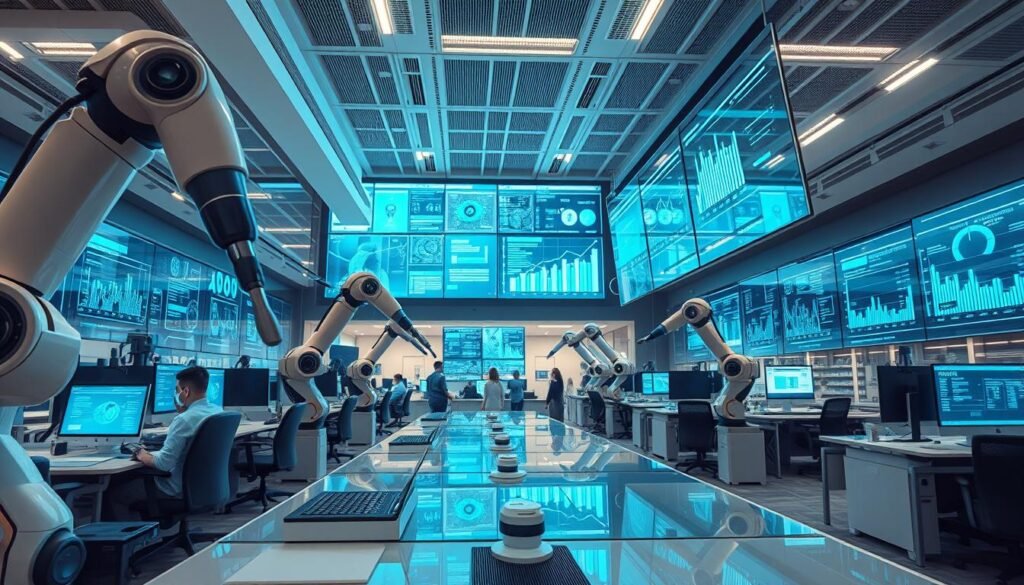
AI Innovations in Drug Discovery
AI is changing drug discovery in big ways. The pharmaceutical world is using AI to speed up finding new drugs. This has cut down the time needed to find drugs that work well.
Studies show that 60% of articles talk about AI in drug discovery13. This fast change lets researchers use big data to improve drug safety and effectiveness.
Accelerating Research and Development
AI helps speed up finding new drugs by using smart algorithms. Machine learning and deep learning are key, with 85% of articles mentioning machine learning13. IBM Watson helps analyze medical data, making decisions faster.
AI not only finds good drug candidates but also checks if they work well. This makes the drug-making process more reliable14.
Improving Drug Efficacy Predictions
AI also helps predict how well drugs will work. 15% of articles talk about AI in finding new antibiotics and designing drugs from scratch13. AI is better at analyzing drug data than old methods.
AI makes it cheaper to find the right molecules for testing. This makes finding new drugs more efficient and successful.
| Aspect | Statistics |
|---|---|
| Total Articles on AI in Drug Discovery | 21 |
| Articles Mentioning Machine Learning | 85% |
| Articles Discussing Deep Learning | 40% |
| COVID-19 Drug Discovery Articles | 7 |
| Companies Utilizing AI for Pharma Growth | 11 |
| AI’s Role in Drug Efficacy | Improving predictions and enhancing drug development |
AI’s progress is more than just new tech. It’s changing how we find and make drugs. This makes it safer and faster to get new treatments to people.
The Role of AI in Big Data Analytics
In today’s world, AI changes how we get insights from big data. It makes analyzing huge amounts of data easier. This way, companies can spot trends and make quick decisions1516.
AI acts like a smart assistant, automating tasks and finding patterns we might miss. This helps in making better choices1516.
Insights from Large Data Sets
AI makes data analysis faster and cheaper. This lets companies quickly respond to new trends and customer needs15. It helps them stay ahead in the market and understand what customers want15.
By using AI, businesses can get deeper insights from their data. This gives them a full view of how things work and helps manage risks16.
AI Techniques for Data Interpretation
AI is getting better at understanding data. New algorithms and machine learning help systems find patterns and offer strategic advice15. Investing in better hardware is also key for AI to work faster and more accurately16.
It’s important to use AI wisely and think about its limits. This ensures AI is used in a way that’s fair and right for everyone16. For more on AI use terms, check out this link.



